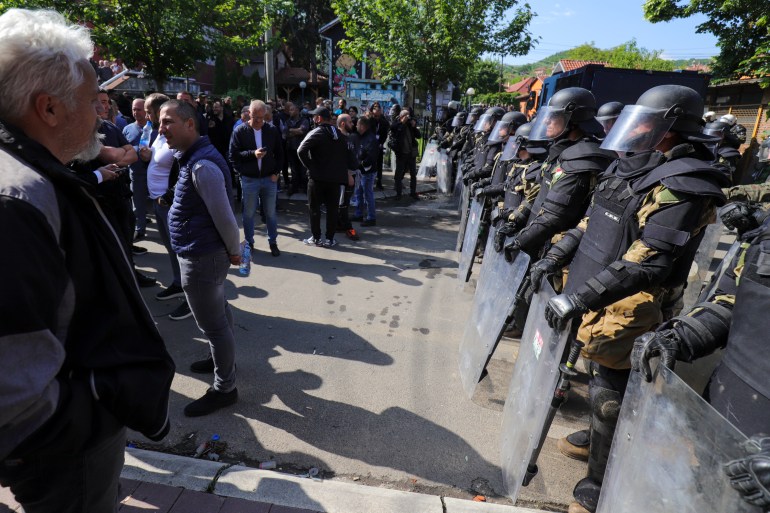NATO deploys more forces to Kosovo after 30 peacekeepers injured
Additional 700 troops being sent; NATO-led peacekeeping mission in Kosovo currently consists of almost 3,800 troops.

NATO is deploying 700 additional troops to northern Kosovo after 30 of its peacekeepers were injured in clashes with ethnic Serb protesters amid a long-simmering dispute.
“We have decided to deploy 700 more troops from the operational reserve force for Western Balkans,” NATO Secretary-General Jens Stoltenberg told reporters in Oslo, after talks with Norwegian Prime Minister Jonas Gahr Store on Tuesday.
Keep reading
list of 4 items‘Kosovo is the heart of Serbia’: Serbian tennis star Djokovic
At least 30 NATO troops injured in clashes with Serbs in Kosovo
Serbia puts army on high alert as Kosovo Serbs clash with police
He said that NATO would also “put an additional battalion of reserve forces on high readiness so they can also be deployed if needed”.
A battalion typically ranges from 300 to about 1,000 troops. The NATO-led peacekeeping mission in Kosovo, KFOR, currently consists of almost 3,800 troops.
The commander of the Allied Force Command in Naples, Admiral Stuart Munsch, said the move was a “prudent measure” ensuring that KFOR has “the capabilities it needs to maintain security”.
KFOR said the 30 hurt peacekeepers from Hungary and Italy had several injuries, including “fractures and burns from improvised explosive incendiary devices”.

The conflict in Kosovo erupted in 1998 when separatist ethnic Albanians rebelled against Serbia’s rule, and the latter responded with a brutal crackdown. About 13,000 people, mostly ethnic Albanians, died.
NATO’s military intervention in 1999 eventually forced Serbia to pull out of the territory and paved the way for the establishment of the KFOR peacekeeping mission.
Serbia has refused to recognise Kosovo’s 2008 declaration of independence. Ethnic Albanians make up most of the population, but Kosovo has a restive Serb minority in the north of the country bordering Serbia.
The latest round of tensions increased during the past weekend, after ethnic Albanian officials elected in votes overwhelmingly boycotted by Serbs entered municipal buildings. When Serbian protesters tried to block them, Kosovo police fired tear gas to disperse the crowd.
In response, Serbia put the country’s military on the highest state of alert and sent more troops to the border with Kosovo. The Serbs protested again on Monday, insisting both ethnic Albanian mayors and Kosovo police must leave northern Kosovo.
On Tuesday, the situation in the northern Kosovo town of Zvecan remained tense with ethnic Serbs gathered outside the town hall that a crowd had tried to storm on Monday. Kosovo police had repelled them with tear gas, before the NATO-led peacekeepers intervened.
The soldiers at first tried to separate protesters from the police, but later tried to disperse the crowd using shields and batons. Several protesters responded by hurling rocks, bottles and Molotov cocktails.
Many Serbs are demanding the withdrawal of Kosovo police forces, as well as the ethnic Albanian mayors they do not consider their true representatives.
Clashes ‘absolutely unacceptable’
EU foreign policy chief Josep Borrell urged the leaders of Kosovo and Serbia to immediately de-escalate tensions, saying the clashes were “absolutely unacceptable”.
He has since spoken to Kosovo’s Prime Minister Albin Kurti and Serbian President Alexander Vucic, asking them to avoid any “further unilateral action.”
Borrell said Kosovo’s authorities needed to suspend police operations focused on municipal buildings in north Kosovo and ethnic Serb protesters should stand down. He also warned that the EU was “discussing possible measures” to be taken if both parties continue to “resist proposed steps towards de-escalation”.
Vucic said 52 demonstrators were hurt in Monday’s clashes, three of whom sustained “serious” injuries. Five Serbs were arrested for taking part in the clashes, according to Kosovo police.